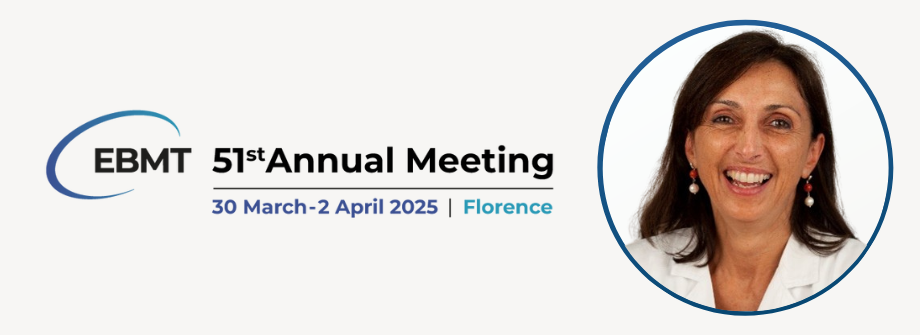
Nicoletta Sacchi, CEO, Italian Bone Marrow Donor Registry - E. O. Galliera Hospital, Genova, Italy.
What initially sparked your interest in haematology, specifically HCT, and what continues to motivate you today?
As a young genetics student, I became interested in human leukocyte antigens (HLA)-typing. I had the opportunity to study the first HLA test to match unrelated donors from the Anthony Nolan registry, because at this time early 90s, this was the only registry that existed, more or less, anywhere in the world. So, in Italy, we performed the first unrelated allogeneic stem cell transplant with a donor from the Anthony Nolan registry.
At the time, everything began with the need to establish a registry in Italy. I had a scholarship to study the matching algorithm and digital typing, and that’s how it all started. To this day, I remain fascinated by this work, especially because I believe unrelated donation is one of the few true examples of human kindness. A perfect stranger is willing to make such an important gift to another stranger, without any barriers of religion, country, ethnicity, or race. It’s truly fantastic, and I’m still amazed and captivated by this aspect of my work.
In your keynote at EBMT 2025, you discussed donor confidentiality. Why do you believe this is such a crucial topic in the context of haematopoietic stem cell transplantation?
Haematopoietic stem cell transplantation is crucial for providing a safe cure to the recipient, but above all, it’s important to protect the donor. Transplant and donor centre physicians are deeply involved in both of these aspects: protecting the donor and ensuring the safety of the donation, as well as the follow-up after the donation. In the case of unrelated donations, protecting the donor's confidentiality is especially important. This not only safeguards the donor, but also the recipient, because the altruistic nature of the donation must be maintained. If the donor and recipient know each other, it could affect the donation process, particularly if there’s a future donation. The donor may no longer be able to freely decide whether to participate again. So, to me, protecting both parties is crucial.
How do you ensure that the ethical considerations surrounding donor confidentiality are consistently upheld, especially in a field as sensitive as stem cell transplantation?
It’s not simple, because when we talk about unrelated donation, we have to consider that a non-related stem cell donor may be linked to over 100 international registries in different countries and continents, each with its own rules and regulations. Many of these countries have internal laws to protect the donor's confidentiality, but others do not. So, it’s very important to harmonise the approach to this issue, in order to protect both the donor and the patient. One way to simplify this is to comply with World Marrow Donor Association (WMDA) standards, ensuring a consistent approach internationally. Additionally, within each country, it’s crucial for the registry to play a role in providing national transplant centres with guidelines on how to handle unrelated donation and confidentiality
Given your extensive experience with the WMDA and various international standards, what role do global guidelines play in ensuring the protection of donor identity and data?
They play a fundamental role. It’s really important that there is a sort of harmonisation among these different sets of standards, both in general and specifically on this topic. For example, Foundation for the Accreditation of Cellular Therapy (FACT), Joint Comission standards, NETCord Foundation, and WMDA all address confidentiality and data protection. We can also mention some regulations, such as the new European Substances of Human Origin (SoHO) regulation, which became effective last year and has a specific chapter dedicated to the protection of confidentiality. This is important.
Can you speak to any emerging trends or technologies that might impact how donor confidentiality is maintained or even enhanced in the future?
On one hand, we see the dramatic evolution of technologies that can negatively impact donor confidentiality. For example, the use of social media (where donor recipients sometimes make appeals that go viral, such as, "I received a donation from Italy, and my donor is a male, can you help?") can pose a problem. The second issue is with health database systems, which are constantly under attack. In the maintenance of databases and IT systems in transplant centres, hospitals, and registries, it’s crucial to have a high level of attention to prevent external entities from breaching these systems and compromising data and confidentiality. This is a major issue we are currently facing. Additionally, there’s a shift in how we approach donor involvement. Cell therapy is evolving dramatically, and the role of unrelated donors is changing. For instance, a donor may make multiple donations of cells and biological material for many recipients, potentially becoming a ‘super donor’. This could also lead to the need for additional genetic testing for specific cell or gene therapies. The challenge is how we manage these data while respecting confidentiality, especially considering that genetic results can impact not only the donor but also their relatives. This is another significant issue we need to address.
What advice would you give to transplant centres and registries working to strengthen their donor confidentiality policies while ensuring timely and safe transplants for patients in need?
It’s important to have a good relationship with IT staff to protect the IT systems and data as much as possible. On the other hand, it’s also crucial to inform all health personnel about the importance of maintaining confidentiality. In some cases, we’ve seen disclosures happen because some younger staff members, for example, share personal information with the goal of helping the recipient. They might say something like, "Let me share the collection centre of your donor to help improve the recipient’s transplant." This kind of disclosure can be very dangerous and jeopardise any subsequent donations, as it becomes difficult to guarantee the donor’s freedom to withdraw their consent.
